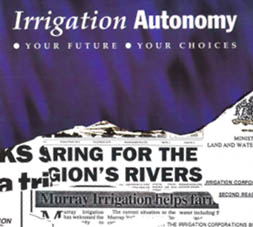 |
 |
|
Self determination
Water prices have been a constant cause of concern for irrigators. In 1975 mass meetings were held to protest the latest price rises, with irrigators suggesting that perhaps they should take on the running of the irrigation system themselves. Dissatisfaction with irrigation operations continued to escalate in the following years. When irrigators in the region were faced with another major price rise in 1987 they united in a “no pay” stance. One of their key complaints was that not enough of the money collected through water sales was being returned to maintain and improve local infrastructure. The NSW Government responded by setting up Irrigation Advisory Management Boards and giving irrigators greater involvement in the operation and management of their regions. In 1989, following a detailed inquiry, the Government separated its state-based water regulation operations from its regional water distribution operations. This created a “State” and “Commercial” arm within what was then, the Department of Water Resources. Irrigators now began lobbying in earnest for autonomous control and ownership of their regional irrigation networks. It took more than five years of negotiations to reach an agreement. In early 1995 more than 700 irrigators at a meeting in Deniliquin voted to support a fully irrigator-owned water supply company in the Southern Riverina. The NSW Government then enacted the final legislation which allowed the hand-over of its irrigation network in the region, and in other parts of the state, to irrigators. |
This brochure was a key document in
discussions about irrigator autonomy. It
outlined the case for a fully irrigator
owned water supply company.
|
|
| sitemap • credits
& references • copyright • local
history links • contact & contribute • VISITORS |
||

